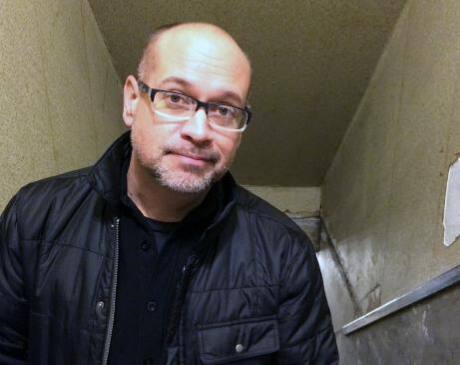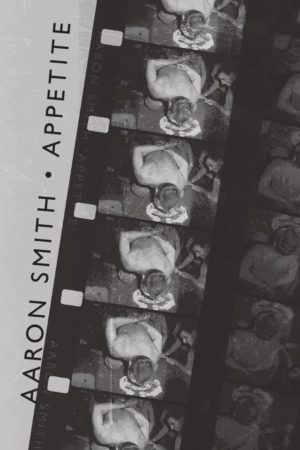In Their Own Words
Aaron Smith's “After All These Years You Know They Were Wrong about the Sadness of Men Who Love Men”

After All These Years You Know They Were Wrong about the Sadness of Men Who Love Men
It's Palm Springs and you've slipped away
from a day of swimming and drinking to lie
for a minute with your eyes closed
in the other room while the air-conditioner
moan-groans outside the window—your body
chilled from sunburn and untouched
for months. Startled from near sleep
you hear a crash
of laughter, man-laughter, the slapping
of bare backs, hands smacking
the skin of men drying
by the pool or making hamburgers
in the kitchen or solving a puzzle
on the glass table in twilight—
Does anybody need another drink?
and laughter. The pizza's here;
Can I have a cigarette?
Pass the pretzels and your name:
Has anyone seen Aaron?
You don't say anything but listen to the man
saying your name—Soon someone will be sent
to look for you, and you'll pretend
to be sleeping, say you must have dozed off,
you'll rejoin the party soon but need
another minute. You want
to remember this. You've waited
your whole life for them to miss you.
From Appetite (University of Pittsburgh, 2012). All rights reserved. Reprinted with the permission of the author
On "After All These Years You Know They Were Wrong about the Sadness of Men Who Love Men"
"After All These Years You Know They Were Wrong about the Sadness of Men Who Love Men" was written after a weekend in Palm Springs with my friend Matt. He lives in Los Angeles and invited me to join him and a group of his friends, most of whom I didn't know, to celebrate his birthday. I was anxious about spending the weekend as an outsider and wondered if I'd be stuck in a house with strangers with whom I had no history or relationships. Despite what gay people like to perpetuate about the notion of community, we don't always get along. Knowing there would be alcohol and a pool, though, I figured the weekend couldn't be a total loss.
The weekend turned out great, and the men were wonderful: inappropriately funny, kind, welcoming. I navigated the weekend as a temporary insider (which still has the implications of outsider status). Some of the men had known each other for years, some were lovers or former lovers, so they had much deeper connections. This temporary immersion into their friend circle allowed me to participate but also to observe the ease and casualness in how these gay men interacted with one another, liked one another, and loved each other.
The moment the poem addresses is true. After swimming and drinking all day, I slipped off to take a quick nap before the evening activities (more swimming and drinking). I was sunburned, sun-tired, and drunk. I could hear all the sounds in the poem (the "moan-groans" of the air-conditioner, the conversations and laughter), and then I became aware of the strange intersection of my personal history and history being made: The queer boy who'd spent a lot of days sad, thinking he'd never find a way or place to be in the world, had traveled a great distance emotionally—and geographically—from a fundamentalist Christian childhood in West Virginia to a house full of men who were like him and liked him. I was happy. I felt comforted by their noises, the way I'd felt comforted as a child the times my parents would stay up late visiting with friends after I'd gone to bed. To hear my parents' voices, the voices of their guests, the sounds of the world going on while I was in bed, always made me feel safe. I was surprised to feel that same thing in that house in Palm Springs, to feel safe in the proximity of these men in the other room who did, eventually, come looking for me.
Since the poem is so much about the speaker listening, it's appropriate that so much of making the poem was in the sound of the words, internal rhymes and repetition ("you hear a crash /of laughter, man-laughter, the slapping / of bare backs, hands smacking /the skin of men drying / by the pool…"). I sometimes know before I write a poem what it will "feel" like to read and what I want it to look like on the page. I knew I wanted it to be a block stanza with organic, uneven lines. I wanted the line breaks to add a restraint to the quick movement the language of the poem establishes (you've slipped away /from a day of swimming and drinking to lie / for a minute with your eyes closed / in the other room…). I wanted sound to move the reader forward while the line breaks halted the reader, stopped them from being swept along. I had no idea how the poem was going to end until it happened. Discounting the instruction to overwrite and then cut back, I wrote line by line, crafting each line as I went. The energy of the creative mind knowing how the poem was going to end showed up, I think, when I wrote "Soon someone will be sent / to look for you." I remember moving quickly from there until the end. I realized then the poem was about arriving at something (both in the writing and in the speaker's life).
The lines I struggled most with were: "your body / chilled from sunburn and untouched /for months." Somewhere in my head were Merrill's lines from "Days of 1964": "Forgive me if you read this…I had gone so long without loving, / I hardly knew what I was thinking." I had been obsessed with the idea of loneliness and what it means to one's perception, so I couldn't decide if I was forcing this idea or if it really belonged in the poem. I was also afraid that the lines would contradict the happiness of the speaker. But then I opted for the complexity of truth, of living in the world in a body, sometimes as an insider, sometimes as an outsider, and, in this case, simultaneously both. Since my favorite poems contain within themselves seemingly contradictory elements, I left the lines to highlight that the poet literally is alone in the moment. I also left those lines because I was conscious of avoiding the traditional narrative of triumph, the summing up of experience in simple phrases like: "It gets better." It might get better, but the complexity, the less-than-perfect day-to-day of our lives is what makes certain realizations, like the realization in the poem that the speaker is living a life he was told was not possible, that much more earned and, hopefully, resonant.
The title came last. After I realized the scope of the experience in the poem, I wanted to give that experience more significance: this moment against many years of history. I love the way poems can capture moments, and the way moments, if we're paying attention to them, are really all we can hope for, and maybe the most we can bear, in any life.



